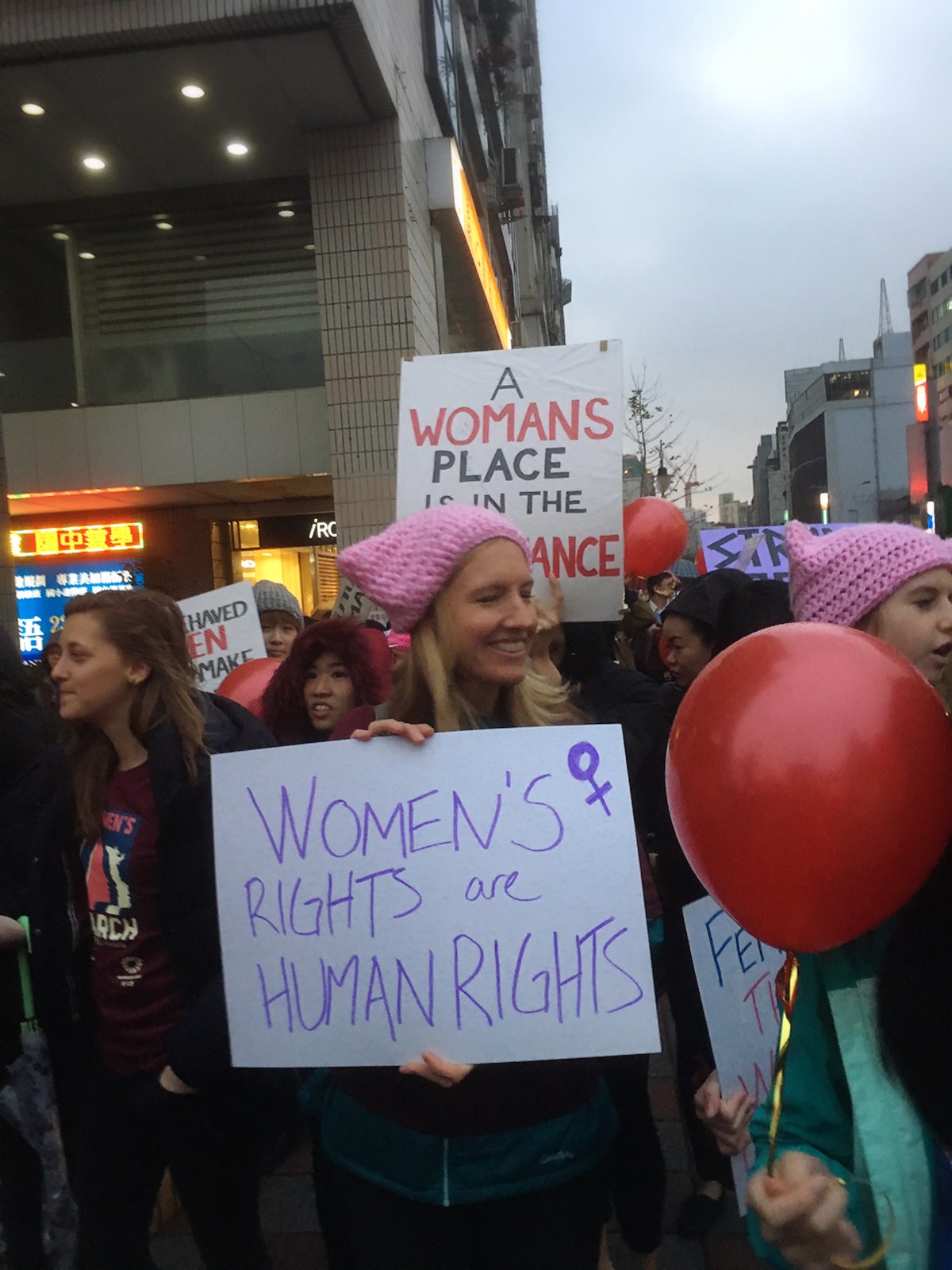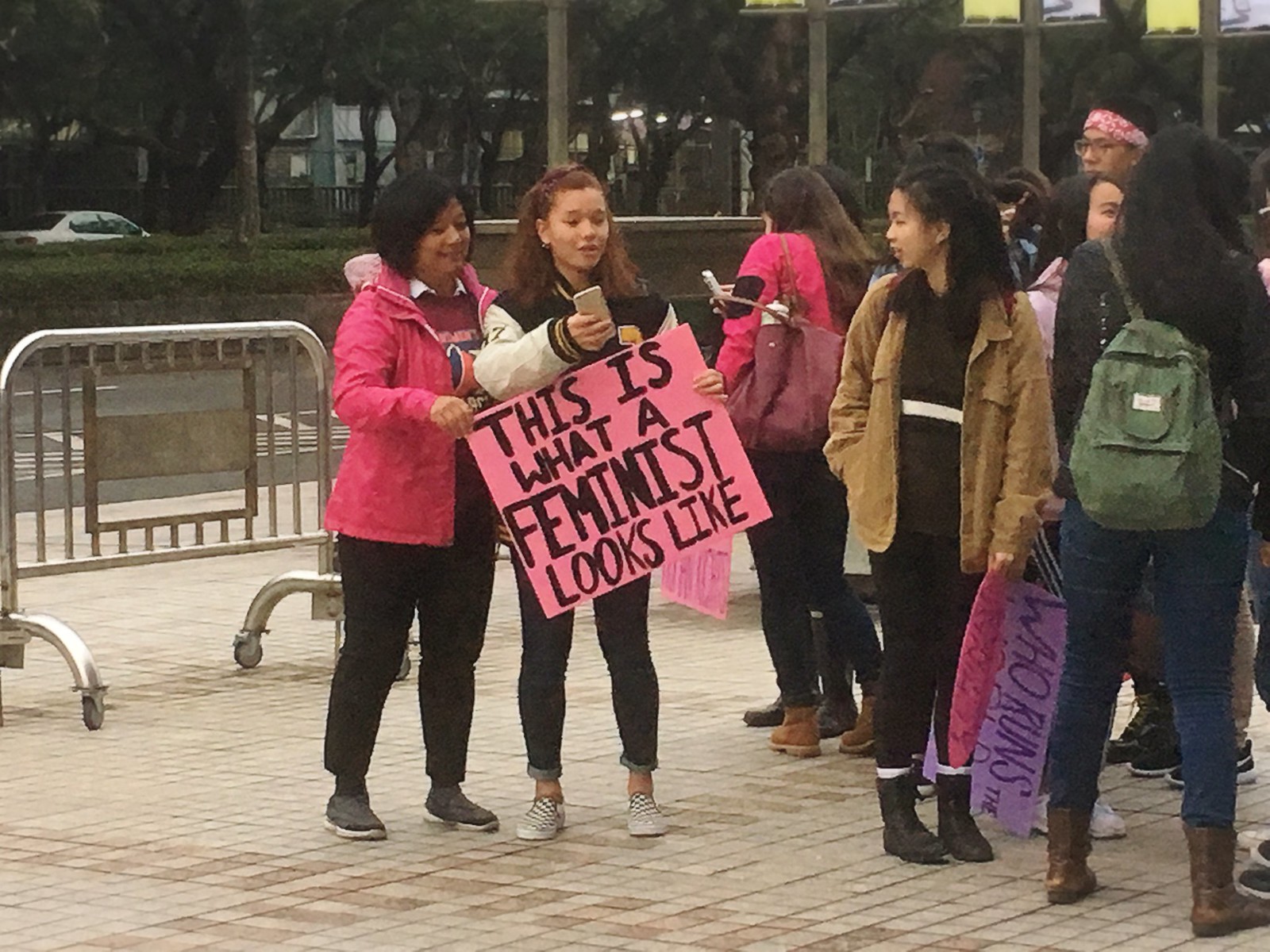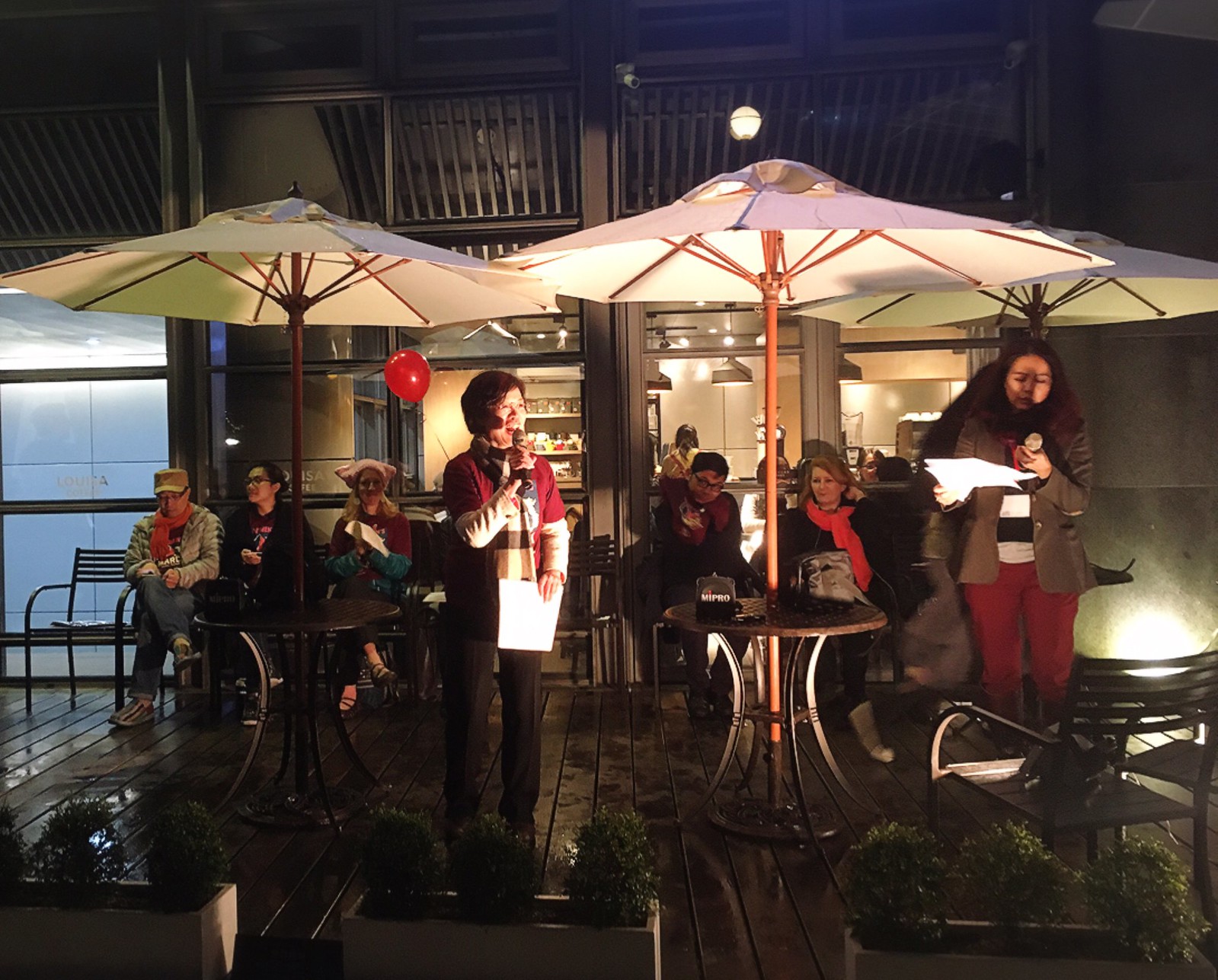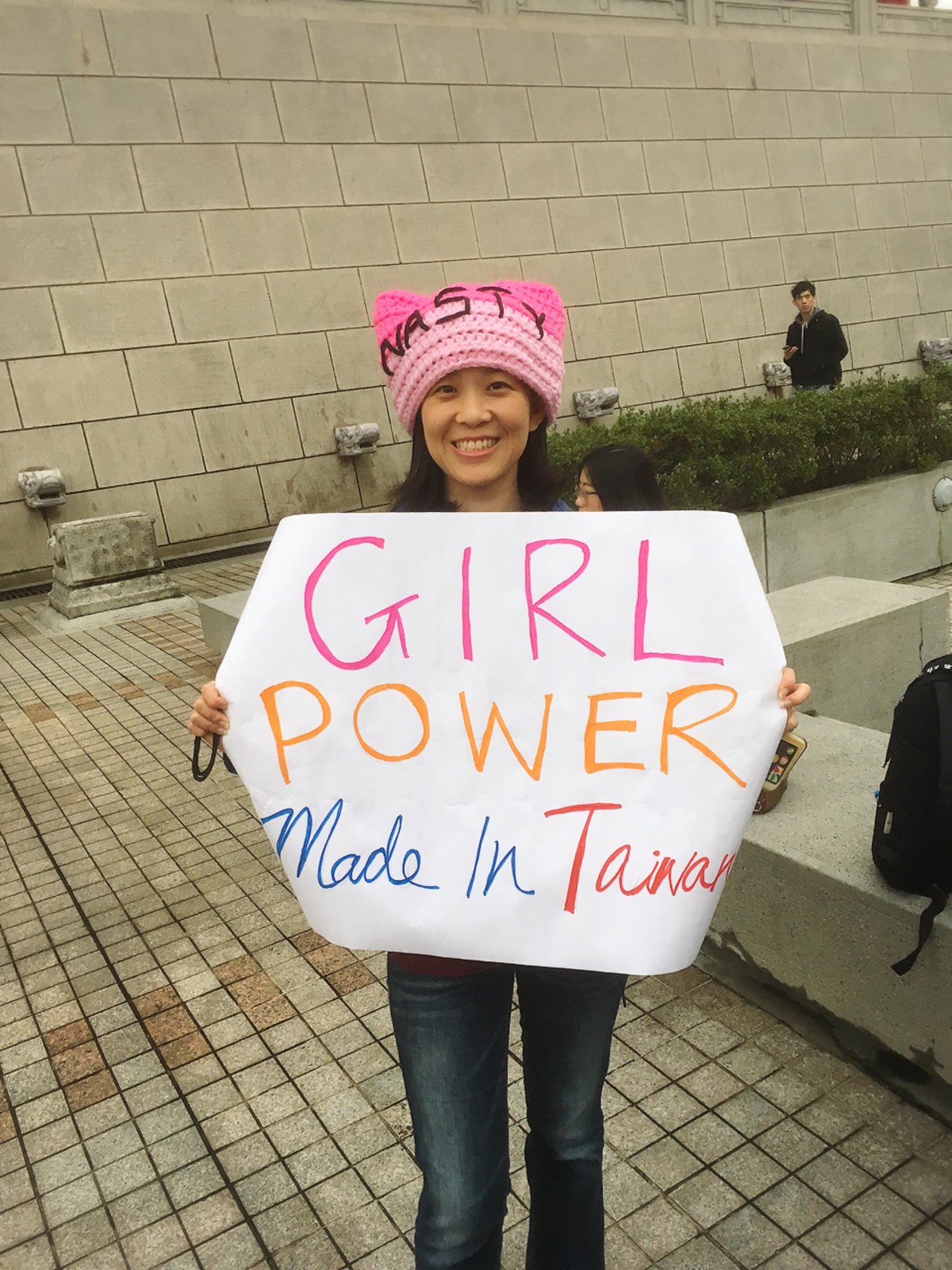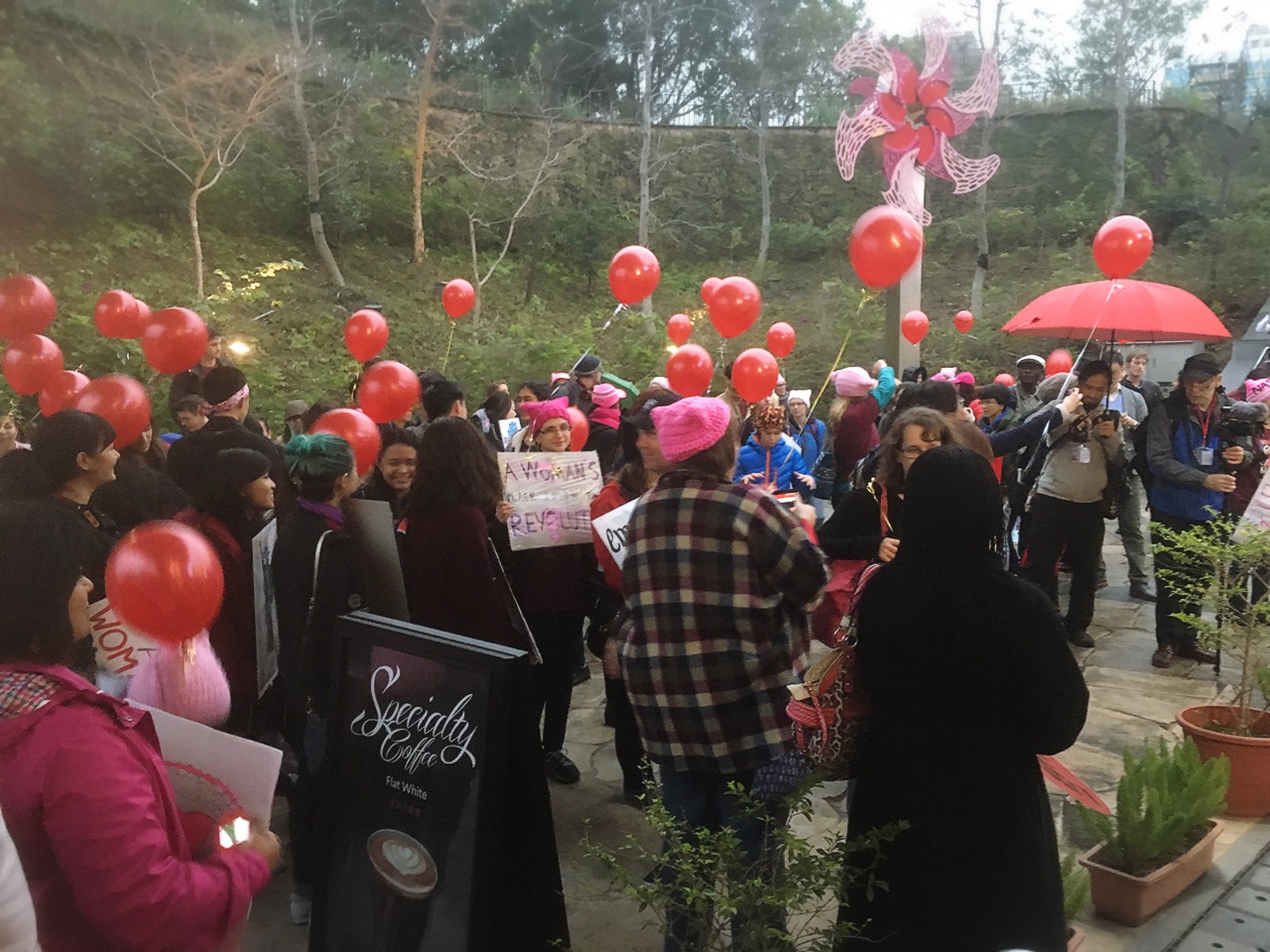A woman in Taiwan attends an event - a popular get-together inclusive of both Taiwanese and expats, billed as "family friendly". During that event, she is groped by an outgoing man who attends many such events. It is not a case of accidental brushing and not a misunderstanding. He grabs and fondles her butt, at length, and when she says something he all but admits it:
"What are you doing?"
"I'm looking for your ass. I can't find it!"
She doesn't know what to do - her first thought is that she doesn't want to 'embarrass' an older man. Only later does she begin to feel that his comfort level is neither her concern nor her priority: he deserves to be embarrassed for what he's done. She lets it stew for awhile, and finally e-mails the organizer (insofar as this event has one - there is someone very nominally in charge).
He asks for information on what happened. Then, as the victim describes it, his response is to say
he's not going to do anything about it - it's her responsibility to either avoid or confront him but he doesn't want to make anyone feel unwelcome at the event. He says the groper has a "reputation for being 'friendly'", although what this means is unclear.
She feels that this is not acceptable - that by allowing someone who fondled her roughly and didn't even act embarrassed about it to attend,
she is being made to feel unwelcome, and that the event has some nominal responsibility to ensure some level of safety for its participants (whether or not the organizer agrees is unclear).
He then agrees to post a notice and clarify that sexual harassment is not acceptable, and does, using her wording. But when pushed, he admits he can't do much to physically ban an assailant from the event as it is "public". He does, however, ask the groper not to return. He wants to use the wording "
she doesn't want you to return". She feels this is not acceptable as it put it all on her, when the problem is the groper's behavior. The organizer agrees to change it.
She still feels the response is not good enough.
I happen to agree in a more general sense: women are being told they are "welcome" but sent the message that an even nominally safe environment (as much as any environment can be totally safe) is entirely their responsibility. Up to a point, if pushed, those nominally in charge will stand up for her. Beyond that point, she's on her own. This is exactly how women come to feel unwelcome.
A lengthy discussion ensues. Many, but not all, women support her. Some, but not all, men either call her claim into question, imply it may have been less serious than it was, or pull a classic "victim blame" -
if you wanted an absolute guarantee of safety you shouldn't attend. People do say
it's your job to protect yourself. Few people say
it's society's job to make sure assailants don't get away with it. The entire burden of confronting not just the harasser but the entire culture falls on her, and a few supportive women. Many who otherwise deem themselves educated, worldly and progressive, claim they have no responsibility to do anything about the environment in general or any specific incident. It's all on the victim to take action, 100%.
The group leans very progressive, and likely thinks of themselves as kindhearted people and gentle souls who come together in neighborly love and community spirit. So kindhearted, so neighborly - until something actually happens and then it's every woman for herself.
Or as one woman in Taiwan put it:
"I think there is a definite subset of liberal/left-leaning
people, men in particular but not solely, who are paradoxically *less* self
aware on the topic of rape culture specifically because they believe they're already
"on the right side": they call themselves feminists; they vote for
leftist candidates; they support transgender rights and equal marriage; etc.
and thus they do not engage in introspection when confronted with the reality
that they're tacitly supporting assault. I see this phenomenon contributing to
the reaction from the [event in question]."
Enough of these "progressive" people don't think a woman needs or deserves the support she's asking for - at one point saying the whole issue is "manblaming" and then "reverse sexism" when it doesn't go quietly away - that she doesn't feel comfortable attending again. Several women she's talked to agree, and also say they will not attend.
I have been invited in the past, but I too will not attend. Not because I fear being groped, but because the entire thing reeks of the sort of environment I actively avoid: pansy-ass so-called liberals who act like they care about what is right but when problems get real, their spines collapse and they blubber away like so many weak-willed jellyfish.
I want to be clear - I am not saying "this guy" or "that guy" or "the organizer" is such a person (I have my personal opinions but that is not the point). It's a general problem, endemic to many cultures, and being an otherwise openminded, progressive, liberal or even good person does not render one immune. Many people - both male and female - think of themselves in all of these positive lights, and yet when problems get real, they dive, dive, dive.
They are progressive and gender-egalitarian until a woman needs social support. They are giving and generous, until they are being asked to give by standing up to something insidious. They are exactly the sort of liberal that a liberal like me doesn't want to spend too much time with. They do not see this in themselves.
I wrote this account with the permission of the victim and purposely did not name names for two reasons: the first is because I was asked not to. Though given a choice I would name the groper, I'm not that sure it matters - while that particular ass-grab was the first I'd personally heard of blatant sexual assault in Taipei's expat-local mingling scene, talking to others revealed that there are many more. That's the second reason: my point is not "avoid this event" or "these two guys are bad". It doesn't matter - a name-and-shame won't do any good. The thing that needs to be said is that this is a generalized problem, and as safe as you think you are in Taiwan as an expat woman, there are a lot of people at a lot of events who don't have your back.
There is a creeper who runs around with probably-fake credentials and certainly-fake humanitarian causes who pervs out on women at expat-friendly events at the first opportunity. There is a guy banned from certain parties for his behavior. There are women who say that joining protests here increases your chances of being sexually harassed or assaulted, and the protest leaders - who are almost always male - either do very little about it, or try to swoop in with some knight in shining armor "
how can we protect our women" nonsense that isn't what the women asked for in the first place. Even the nice ones. Or rather, the "nice" ones. Years ago, a Western woman told me about trying to join a photography club that had events held in English. It was almost entirely Western men, and she was the only Western woman. She wasn't told she was unwelcome, per se, but while some of the Taiwanese women talked to her the men more or less ignored her, or treated her patronizingly. She got the distinct impression that she wasn't wanted, and didn't return.
There are more.
In the Taipei-expat scene, especially where it bleeds into the local scene, you will meet a lot of interesting people. You'll also meet some losers but you won't dislike them too much. They will lean very progressive - Trumpists, tea party or "YAY BREXIT" troglodytes exist, as well as some very off-putting misogynists, tinfoil hatters and straight-up jerks. So, like anywhere really, except magnified because there are not that many Western expats in Taiwan. What you also learn quickly is that it seems as though the misogynists, Trumpist types and tinfoil hatters keep to themselves, and you will generally meet the leftie, hippie, possibly interested in "Eastern religion" (whatever that means) folks who seem pretty okay at first.
You will probably think they will be more supportive - after all, they just spent like five minutes telling you how strongly they believe in women's equality, right? You think either there aren't going to be perverts in their midst, or if there are, that you'll be able to get help. That people will back you up and support you without your having to insist several times. You do not imagine that you will be treated as 'demanding' or 'annoying' (even if nobody says those words) or be made to feel unwelcome, like the broad who killed the party, for speaking out.
What you then learn is that if you are ever harassed or assaulted at an expat gathering, none of the above is true. People will curl up in themselves like those bugs that turn into circles when you touch them.
That's too bad, but it's a public event, there's really nothing we can do. Or,
women basically have to protect themselves everywhere, it's not our job (wrong. It is society's job to stand up against its worse elements in solidarity with someone who has been harassed or targeted).
If you are worried about being harassed, don't go (alrighty then, I'll just go back to the harem and watch everything from behind a screen).
But he's really a nice guy, he probably didn't mean anything by it. Even worse, you might hear
maybe she brought it on herself, maybe she was flirting with him. It's not the group's responsibility to deal with these incidents, if people exchange contact details, they can't be held responsible even if worse things happen (a real comment that was made - in Chinese though).
It could be cultural differences (it wasn't, and even if it were, it's not like Taiwanese society is permissive of sexual assault, though to be fair the person who said this did so before the nature of the assault was clarified. He thought it might have been something like a kiss on the cheek - a bit weird in Taiwan but mostly permissible, perhaps even expected, in the West).
They will say quite a bit about what you can and should do to protect yourself - nothing terribly offensive in and of itself, but completely lacking in any awareness that it's a community's responsibility and society's responsibility to stand up for its members when they are treated this way. All about what
you should do (which is fine) but nothing about what a
group should do, or
bystanders should do, to keep an event advertised as "family friendly" as truly friendly and welcoming to all (which is not fine).
Worse, that if you fear for your safety you should bring mace, or a taser, or pepper spray with you to defend yourself. Sure, I feel really super welcome and included at an event where the only way to ensure my safety is by carrying an electric shocker and mace, because I can't be assured the people around me will help me stand up against a harasser. Uh huh. Wow, the welcome-ness is astounding. Group hug!
What it adds up to is this: people talk about how safe Taiwan is. Women can walk down the street alone at all hours of day or night. The chances of being jumped, assaulted, raped or mugged are nil. This is all true, and Taiwan has a very low rate of these kinds of crimes. But it is not entirely safe for expat women, because expat men - and some women - are too gelatin-spined to come together to create a safe environment.
Again, I do not attend many big expat events, not because I fear for my safety or think I couldn't handle it if I were assaulted, but in part because I expect better of the people I spend my time with. The groper is at fault here, but to be a person of character you must also stand up to gropers. Look at the people around you. Do you think they would, if you were groped?
How is this different from basically any other country, even "progressive" or "modern" ones?
Beyond this flying in the face of people saying Taiwan is so safe (even though in many ways it is), it's also that the expat community, even as it blurs into the local one, is small. People know each other. I know the groper, the groped, and the organizer. I am upset and angry that people I thought of as friends - though not close ones - could do this (in one case) and react like this (in another). It's harder to avoid people, and it's hard to get people to stand with you against other folks they socialize with regularly. It's much easier to end up as the broad that
everyone knows "killed the party", rather than just being able to move on. It is much harder to be anonymous - I don't even bother - and much harder to just find a new crowd if you find out your old one was full of gropers and rape culture apologists.
It's hard because, with an overwhelmingly male expat community - and not all of them even passing the nominal tests of being liberal and egalitarian, quite a few are straight up misogynists - often people
just. do. not. get. that while, yes, people have to watch out for themselves, that there is also a responsibility of an event, a community or even a random crowd of people to work together to create a safe environment for all. That means standing up to sexual assault or harassment when you see it happening to someone else, as well as taking action when you are in any sort of position of power to do so after the fact, if you hear about it. This
is important and it
is the only way we are going to defeat rape culture. It is also the only way women are ever going to be able to feel as fully welcome as men at any public event.
I know how difficult it can be - I once had a party where one guest verbally assaulted another. It wasn't as blatant as, say, racial slurs but he was absolutely very angry about racial dynamics that had impacted his life in the past. While I have sympathy for that, it was no excuse to go after my friend as an individual, who had done nothing wrong, because he happened to belong to the group he maligned. I did try to stand up to him, tell him to stop, insist on changing the subject. He wouldn't. I didn't like him very much - he was my friend's boyfriend, not my friend. I felt later that I should have physically stood up and, regardless of how it might make his girlfriend (my friend) feel, tell him he must either stop immediately or leave. He did eventually stop without my having to do that, but I should have taken a firmer stand. So I get it, it's hard to do. That's why it is imperative that people of good character look back on their mistakes and missteps and consider the future, and how they might be better people with firmer spines. Even when it's uncomfortable. Even when more than one friend is involved.
It's different because there is often a language barrier. Not in this case, but getting local authorities involved can be difficult in cases where the victim doesn't speak Chinese well.
It's different because there are so few expat women compared to men: no clear numbers seem to be available but it has been estimated that the split is something like 70/30. A lot of men I know don't know very many Western women who aren't me. A lot of women I know complain that it's hard to connect with other women. Because so often women have to push men to do the right thing in these cases, yet there are so few women and events are likely to be predominantly men, it can be harder to get that support. There is a greater chance of the women being shouted down simply because there are fewer of them, and events that are mostly men can at times take on a bit of a sausage-fest feel like the aforementioned photography club, which further alienates women from attending. Even at work, at most workplaces - because I freelance - I am one of maybe two female teachers at most. At times I have been the only one. I do not think my male coworkers are threatening in any way, but the disparity is noticeable and it does mean I have to, say, fight a bit harder for a fair, not-sexist dress code when the guys don't see what's wrong with what's already written, just to take one example.
And finally, it's different because it's so easy to default to the excuse of "cultural differences" even when it's complete nonsense. There is no "cultural difference" that allows sexual assault, both cultures understand quite well the line between silly flirting and straight-up harassment or groping.
Go ahead and read up on my experience being nominally annoyed by two teenage boys at an all-night aboriginal festival here (you have to scroll to find the story) to see an example of how good, spineful people of wildly different cultures understand what needs to be done.
This guy gets it. That means it is possible to improve things.
To end on a positive note, something I have noted is that when women do turn to other women in this community, the response is overwhelmingly supportive. When we come together and talk, things do get done because we stand by each other as we fight our respective battles. This, and not "
oh it's not my responsibility wah wah wah if you don't feel safe don't come but everyone is welcome and maybe it was cultural differences he's just friendly wah". I seek out supportive people.
In a general sense I need to say this: gropers and the invertebrates of poor moral fiber who don't think they need to be a part of a cohesive society that works to end sexual assault by standing the fuck up? Jellyfish who'd rather flit away, transparent, on whatever wave takes them away from discomfort when they could have done something?
They are no friends of mine.
